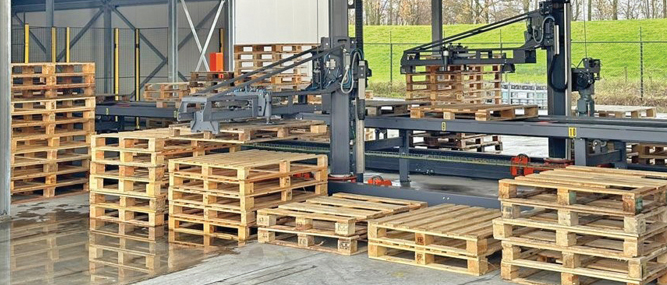Automated Machine Systems (AMS) and Pallet Sorting Systems (PSS) have entered into a partnership to exclusively represent each other’s equipment in the United States and Europe. AMS will represent PSS equipment in North America while PSS will sell AMS equipment in Europe. This allows both companies to sell into each other’s markets with unique solutions they offer. Both Kris Chayer, president of AMS, and Roel de Vries, owner of PSS, met at Interpal and begun discussing the formation of a business alliance.
Kris Chayer, president of AMS, said, “I started seeing some of his equipment. His multi-sort line and other equipment has some functions that we don’t offer. So, instead of recreating the wheel, we are trying to achieve some synergy together. I just love his quality and the software behind his equipment.”
Pallet companies in North America would likely have interest in the high-speed Multi Pallet Sorting Line offered by PSS. This system can handle up to 20 sorts of non-standard sizes. Also, its In-line Stacker System is unique compared to most equipment offered in North America. It can handle a wide variety of widths without adjustments needing to be made, and the software does not require bar codes to manage the line.
Chayer is really excited about the potential for the Multi Pallet Sorting Line. He explained, “We do have a line that sorts multiple pallets, like different GMAs. But PSS has a multi-sort that can do all kinds of odd-sized pallets. Nobody wants to buy stackers for the oddball sizes. The Multi Pallet Sorting Line can sort anywhere from 39 inches to 52 inches without restriction. And it can tie into our basic repair line.”
The Multi Pallet Sorting Line uses robotic arms on a gantry that moves up and down a line taking a pallet and stacking it on various stacks on the floor. The process usually starts with a destacker/tipper where an operator can use push buttons to dictate where a pallet goes on the line. The system can also use an automatic pallet selector inspection tunnel to do the same thing. The robotic arms pick up the pallets by the sides and move them to the appropriate stack and then goes back to retrieve another pallet. According to PSS, its system can process 400 pallets per hour. The gantry system can be in a line, T-shape or in an L-shape depending on your facility.
The Inline Stacker is similar to how repair lines work in the United States. But it has a few unique benefits compared to the stacker configurations offered by AMS. Chayer explained, “The way the PSS Inline Stacker System is designed the widths don’t matter, which makes it more variable. And its computer software tracks everything without the need of barcodes.”
Roel de Vries said, “The Multi Pallet Sort Line and the Inline Stackers with all accessories from PSS will be sold, produced and serviced by AMS in America.”
Once AMS produces the first PSS system, it expects to offer the equipment in normal lead times anywhere between three to six months depending on the current workload and the design of the line.
PSS will also sell some of the equipment and software developed by AMS. Appreciating some advantages of the AMS product line, de Vries suggested, “We are interested in the AMS single paint booth. We are interested in the PalMate ERP software. AMS has a single paint booth without filtering that are required by some poolers. We tried one on our own, and it didn’t function as well as the one developed by AMS. We will be collaborating with other products in the future.”
Chayer believes the expertise of PSS will help AMS improve its manufacturing processes as well. AMS will manufacture, install and service PSS equipment based on the specific direction and designs from PSS. Chayer admitted that the manufacturing process at PSS is ahead of what suppliers in the United States achieve in terms of efficiency. He explained, “The way PSS designs their systems, they are prefabricated, universal and interchangeable. Everything is modular and works together. If you want rollers on one side, you can. Or the other side, no problem. He manufactures everything in such a way that it’s never for one customer only and that modularity helps drive down total system costs. “
He added, “The PSS line of equipment are very unique designs, and it is crafted to be beefy. It is also designed to be easily maintained and replaced. For example, PSS does a lot of fabrication welding with bolting. This allows you to easily replace parts or sections. This approach is unique to what is commonly done by U.S. equipment manufacturers including ourselves.”
Safety is built into everything PSS does because Europe has much more stringent safety requirements than the United States. Enhanced safety features come with every PSS line.
Talking about resale value, de Vries commented, “Two years ago a client of mine lost his account with a major client, we bought the machine back and sold it to another client. Now the system processes GMAs as well as red pallets. Now, it’s doing multiple sorts. This shows the versatility of our systems.”
From eliminating bar codes to having greater sort variability and process tracking, AMS is excited to be able to offer these technologies to recyclers in North America. For more information on the Pallet Sorting Systems equipment, email solutions@automatedmachinesystems.com, contact AMS at (877) 267-8384, or visit www.automatedmachinesystems.com.





